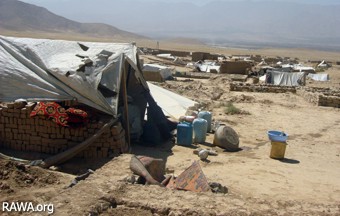By Richard Norton-Taylor
A growing humanitarian crisis in Afghanistan is being overlooked as an unknown number of people are fleeing their homes, caught between security forces and the Taliban, Red Cross officials have told the Guardian.
They say they have less access now to displaced people than at any time over the past 27 years. "The conflict has not only intensified but it has also spread over the last few years. Prolonged human suffering is causing real concern in ever larger areas," said Reto Stocker, head of the International Committee of the Red Cross delegation in Kabul. "There is little capacity to address it. We've never had so little access."

A newly established refugee camp 60 km away from Kabul city where hundreds of families live in hell like conditions. (RAWA photo, Sep. 24, 2007)
Help RAWA Resettle the Families in Afghanistan
With the emphasis placed on security and development aid, large humanitarian needs were being overlooked, he said.
According to British estimates, there are 23,000 displaced people in the Lashkar Gar region of Helmand province, the base for more than 7,000 UK troops. It is impossible to judge the accuracy of the figure and there is no way of knowing how many people are displaced throughout the country, Stocker said. "Some areas are completely inaccessible."
Travellers on one of the country's most important roads, between Kabul and Kandahar, are subjected to daily attacks, he added.
Stocker said Taliban supporters force Afghan villagers to feed and shelter them at night. Then the Afghan security forces accuse them of supporting the Taliban and force them to leave their homes.
Stocker is in London to meet officials in the Foreign Office, Ministry of Defence, and international development department. He said the ICRC spends about £50m a year in Afghanistan, double the amount earmarked for the country. The shortfall is made up by taking money from other parts of the ICRC budget.
"We are not funded adequately," said Stocker, who described the ICRC as the only organisation mandated to talk to "the armed opposition" - the Red Cross's official description of the Taliban. The ICRC arranged daily exchanges of prisoners when the Taliban ruled the country.
The ICRC deploys 80 staff there, supported by 1,200 Afghan employees. They help an estimated 80,000 Afghans who have lost limbs, mainly as a result of landmines. They also monitor the treatment of detainees, including those handed over to the Afghan authorities by Nato troops. The number had risen from 5,000 to 13,000 in two years, Stocker said. They were being held in prisons and detention centres designed to accommodate a quarter of that number. The figures do not include an estimated 630 Afghans held by US forces.
Red Cross officials echo concern recently expressed by Oxfam about the dangerous confusion between Nato-led military and civilian operations. Nato-sponsored provincial reconstruction teams are treated with suspicion by Afghans, who believe they are controlled by foreign soldiers, the officials say.
Officials from humanitarian organisations paint a very different picture of Afghanistan to the one presented publicly by ministers.
In a speech yesterday David Miliband, the foreign secretary, said Britain should help spread democracy round the world. Speaking on condition of anonymity, humanitarian groups say most Afghans want security rather than "democracy" as represented by a powerful elite in control in Kabul. Afghans are increasingly dependent on central government and a corrupt national police force, even though their loyalties are with local elders, officials say.
They add that last year an estimated 550 Afghan businessmen and their families were abducted - victims of extortion. This is rarely mentioned yet has an important impact on the Afghan economy, the officials say.
Aid agency staff also express concern about British plans to train defence forces consisting of local volunteers. The US and Hamid Karzai, the Afghan president, have opposed the plan, saying they could turn into Taliban militia. "What message does that give to the Tajiks in the north when you are arming Pashtuns in the south?" one official said. British officials defend the plan, though they say the proposed groups must be properly monitored.
The Ministry of Defence yesterday announced that Afghan forces, operating with British troops, had seized a tonne of raw opium and about 20kg of pure white heroin powder in the Mosulmani area of Helmand province.



